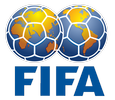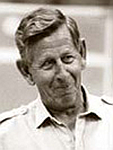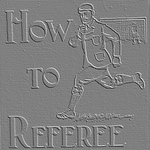Introduction:
What the Laws say:
Routine and responsibilities.
List of Fourth Official's Responsibilities. |
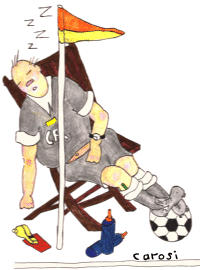 |
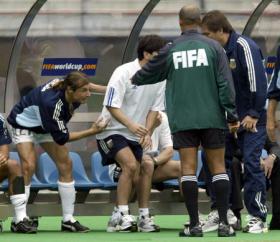
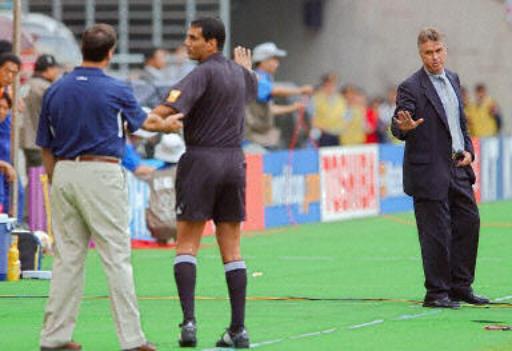
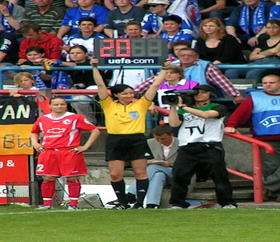 |
Prior
to the start of the competition, the organizer states clearly
whether, if the referee is unable to continue, the fourth
official takes over as the match referee or whether the senior
assistant referee takes over as referee with the fourth official
becoming an assistant referee.
The fourth official assists with any administrative duties
before, during and after the match, as required by the referee.
He is responsible for assisting with substitution procedures
during the match.
He supervises the replacement footballs, where required. If the
match ball has to be replaced during a match, he provides
another ball, on the instruction of the referee, thus keeping
the delay to a minimum.
He has the authority to check the equipment of substitutes
before they enter the field of play. If their equipment does not
comply with the Laws of the Game, he informs the assistant
referee, who then informs the referee.
The fourth official assists the referee at all times.
After the match, the fourth official must submit a report to the
appropriate authorities on any misconduct or other incident,
which has occurred out of the view of the referee and the
assistant referees. The fourth official must advise the referee
and his assistants of any report being made. |
Introduction:
The aim of this page is to provide a comprehensive understanding of the
Fourth Official's role. At the bottom of this page, you will find an
extensive listing of what a Fourth Officials responsibilities are - this
is dependant on which duties the match Referee wishes to assign to the
Fourth Official. Nevertheless, the listing demonstrates the important
(often-underrated) role that the Fourth Official often takes. The higher
the standard of football, the more responsibilities the Fourth Official
will have. For example: - the extraneous duties expected at the top
level (such as in an English Premier League match) include involvement
with crowd security aspects in conjunction with the security staff,
media relations, and onerous administrative procedures such as the
procedural paperwork involved with substitutions etc........ The Fourth
Official comes under the authority of the Referee at all times, and it
is the Referee's duty to clarify what he expects his Fourth Official to
do. The Fourth Official must be made to feel part of the Referee's team,
and not as sometimes happens, just a person to make up the numbers to
comply with the Competition Rules.
History:
The Fourth Official is the newest breed of match official required to
control the game of football (soccer), and as such, his role has
developed slowly over the past few years. He has now become an
important, essential and active part of the Referee's integrated team.
In 1991, the Fourth Official was officially introduced into the Laws of
the Game. At that time, the Fourth Official's role was basically to take
over from any of the three match officials, should one of them be unable
to continue due to an injury. He was also asked to deal with
administrative duties, control the replacement footballs, and to check
the substitutes' equipment. The Fourth Official's role developed further
over the ensuing years, giving him more responsibility and credence. In
1995, the Fourth Official was recognized as part of the officiating
team. In 1996 he was given the new responsibility of reporting any
occurrences out of the vision of the Referee and the Assistant Referees.
1999/2000 allowed the Fourth Official to communicate direct with the
Referee, and not necessarily via the Assistant Referee (as had been the
case in the past). Informing the Referee of unruly behavior from the
Technical Area was also added at this time. This created an official
direct relationship between the Fourth Official and the Referee. Fourth
Officials then became an essential part of all top-level games.
In 2000/2001, the Fourth Official was given the new responsibility of
informing the Referee if a player or substitute:
 - (a) Has been cautioned or sent off based on an incorrect
identification:
- (a) Has been cautioned or sent off based on an incorrect
identification:
 - (b) Has not been sent off despite having received a second caution: or
- (b) Has not been sent off despite having received a second caution: or
 - (c) Has committed violent conduct out of the view of the Referee and
Assistant Referees.
- (c) Has committed violent conduct out of the view of the Referee and
Assistant Referees.
In 2001/2002 Fourth Officials were allowed to approve a player's return
onto the field of play, after the player had been treated for bleeding
or blood on the uniform. Also, to check players in situations where they
have been asked by the Referee to leave the field of play due to
equipment problems. The evolutionary integration of the Fourth Official
allows the Referee, his Assistant Referees, and the Fourth Official to
form a stronger and more efficient team.
The Referee, along with the rest of his team (Assistant Referees and
Fourth Official) is responsible for controlling the game as efficiently,
effectively, and unobtrusively as possible. Each official will have his
or her own personality - and this plays an important part in the makeup
of the team. Officials will develop their own style of conduct; it is
the Referee's task to lead his team, and to harness the qualities of all
his members within a common boundary of standard practices. An
individual's style should not interfere with the Referee's control or
the flow of the game. It is important that the team establish clear
communication between each other and the players (and the team managers)
without causing undue attention to be drawn towards themselves and away
from the matches itself. After all, the spectators want to see a game of
football, and not to witness officials who are trying to attract
attention to them for one thing or another.
A common accolade often heard describing a match official, is when
players or managers comment after the game:
" I didn't even notice you in the game".

But it must be remembered - that there will always be times when the
match officials will need to make themselves know!
What the Law says:
The Fourth Official may be appointed under the competition rules and
officiates if any of the three match officials is unable to continue.
Prior to the start of the competition, the organizer states clearly
whether, if the Referee is unable to continue, the Fourth Official takes
over as the match Referee or whether the senior Assistant Referee takes
over as Referee with the Fourth Official becoming an Assistant Referee.
The Fourth Official assists with any administrative duties before,
during and after the match, as required by the Referee.
He is responsible for assisting with substitution procedures during the
match.
He supervises the replacement footballs, where required. If the match
ball has to be replaced during a match, he provides another ball, on the
instruction of the Referee, thus keeping the delay to a minimum.
He has the authority to check the equipment of substitutes before they
enter the field of play. If their equipment does not comply with the
Laws of the Game, he informs the Referee.
The Fourth Official assists the Referee at all times. He must indicate
to the Referee when the wrong player or substitute is cautioned because
of mistaken identity or when a player is not sent off having been seen
to be given a second caution or when violent conduct occurs out of the
view of the Referee and Assistant Referees.
The Referee, however, retains the authority to decide on all points
connected with play.
The authority of the Fourth Official now also allows him to take action
in situations concerned with actual play.
After the match, the Fourth Official must submit a report to the
appropriate authorities on any misconduct or other incidents that have
occurred out of the view of the Referee and the Assistant Referees. The
Fourth Official must advise the Referee and his Assistants of any report
being made.
He has the authority to inform the Referee of irresponsible behavior by
any occupant of the technical area.
Routine and responsibilities.
Arrival at the ground.
Invariably, at games in the lower leagues, the Fourth Official will very
often be an experienced local Referee, purposefully chosen to make the
traveling Referee and his two Assistant Referees welcome at the ground.
Due to his local knowledge, the Fourth Official will probably already be
familiar with the ground layout, the ground staff and team officials. It
is very important in such circumstances, that the local Fourth Official
should arrive at the ground before any of the other officials arrive -
the other officials may have traveled some distance to the ground. Be
smart in appearance, and welcome your colleagues to the ground. Find out
beforehand, where the officials' changing rooms are. Make yourself known
to the ground staff and the team managers. This all helps to make any
traveling officials welcome, and at ease when they arrive. Of course,
the Referee, Assistant Referees, and the Fourth Official must all be at
the ground at the time prescribed by the rules of competition, and at
the very least 30 minutes prior to kick-off. Officials are recommending
arriving in good time. This will ensure that there is enough time to
check the facilities, and to allow for any adjustments to be made to the
field of play etc. Close co-ordination by telephone with the Referee, in
the days before the match, will allow the Officials to meet together as
a team in plenty of time before the game starts.
Referees usually like to follow a set routine before their games. This
allows them to feel relaxed and comfortable, in the knowledge that when
they enter the field of play, they are not flummoxed or panicking about
something they have forgotten, or have failed to organize something
properly. It is very important that the Fourth Official arrives in good
time to allow the Referee time to properly brief all of his Assistants.
The Referee will not be very pleased with you, if you arrive 5 minutes
before kick-off, after he has briefed his Assistant Referees, and just
as he is about to enter the field of play to start the game. The Fourth
Official should participate fully in the Referee's pre-match brief. It
is during this brief, that the Fourth Official will learn of his
responsibilities - as meted out by the Referee.
Some Referees like to deliver their pre-match brief whilst 'inspecting
the field of play'. The Fourth Official should take special note of the
Technical Area positions, during this pre-match field of play
inspection. It is usual practice for the Referee, Assistant Referees,
and the Fourth Official to participate together in carefully inspecting
the field of play to ensure the adequacy of markings, safety, general
playing conditions, position of the benches, and to decide the best
touchline position for the Assistant Referees to take. This ritual also
allows the Referee to form a bond between his team, and gives the match
officials time to discuss any particular game points.
The Fourth Official can be given the responsibility for obtaining and
inspecting the match balls. Don't wait for the Referee to give you this
responsibility - get to the ground early and complete this task before
the other officials arrive.
The Fourth Official should be fully prepared at all times, to take over
either as the Referee, or one of the Assistant Referees. The Fourth
Official should ensure that he arrives at the ground with additional
equipment such as spare flags, clipboards, coins, whistles etc.
Pre-match instructions.
The Referee will normally brief his Assistant Referees and the Fourth
Official before the game commences. This will allow the Referee to
instruct the other officials on what he expects them to do during the
game, and to make clear what the responsibilities of each of the
individual officials are. The briefing also allows the other officials
to discuss and to help the Referee with his match plan. Most Referees
are willing (and actively seek) input from all of their team. The
contents of pre-match briefings are discussed on the Assistant Referee
page on this web. The Fourth Official's particular responsibilities are
discussed throughout this ' Fourth Officials ' page. The Referee will
explain what signals he expects from his Assistant Referees' and Fourth
Official. The competition rules should also be discussed. This will
ensure that all the officials are aware of: Length of play? Whether
extra time will be played if there is a draw? The number of permitted
substitutes? Any particular competition variations to the normal rules?
Etc.........................
Fifteen minutes prior to kick-off.
Some competition rules require an inspection to be made of the players'
equipment (look for earrings, finger rings, sharp damaged studs etc.)
The Senior Assistant Referee or Fourth Official may be delegated to do
this task by the Referee. Besides this, they may also be asked to check
any 'Team-Sheets’, and to ensure that any other pre-match paperwork has
been dealt with correctly.
Some further Fourth Official pre-match responsibilities are as follows:
Ensure that the substitutes are seated (or located) in the correct place
before the game starts.
Keep the key to the officials' changing rooms on their person.
Organize when the floodlights need to go on, and find out beforehand who
is responsible for doing this.
Check all the balls.
Check and obtain and verify completion of the team sheets in good time.
Agree with the Senior Assistant how substitutions will be dealt with,
and what signals are to be used between themselves and the Referee.
Clarify how to bring to the Referee's attention, any incidents on the
field of play (or off the field of play) which merit a sending off.
Seeking the Referees attention can be managed through the Assistant
Referee who is nearest to the Fourth Official. If the Fourth Official
has seen a violent conduct incident on the field of play, which has been
missed by the other officials, he can signal directly to the Referee, or
he can approach the nearest Assistant Referee and ask him to signal to
the Referee.
Each Referee will have his own view on which tasks he wishes to delegate
to the Forth Official. A good Referee will ensure that the Fourth
Official is made to feel an important part of the Team. The Referee
should delegate important responsibilities to the Fourth Official. I
have been a Fourth Official on several occasions, and it is very easy to
feel the odd-man-out in the team. Invariably, the Referee and Assistant
Referee will have traveled to the ground together; they may already know
each other from officiating in their local area league. The Fourth
Official can be made to feel unwanted - it has happened to me on several
occasions. The Fourth Official can see himself as 'additional baggage'
that the Referee has been foisted to accept. The Referee must not limit
his conversation to his Assistant Referees, but must integrate all of
his officials during conversations, especially those who may initially
be shy or uncomfortable with any stronger personalities within the team.
I remember one particular instance, when the Referee and his Assistants'
obviously knew each other very well - they talked and talked and
talked........ before the game. But they completely ignored me - the
poor Fourth Official who was trying to make himself noticed in the
corner of the changing room.
I felt unwanted. I felt as though my role was only ceremonial. I felt
that I did not have anything particular to do except throw on the
replacement balls. I felt that my colleagues were not interested in me.
I felt that I was inferior to them. I felt like going home. These
feelings affected my approach to the game, and I was confused as to what
my responsibilities were (if any). Should I approach the grounds man to
ask him to turn on the lights when it begins to get dark, or will the
Referee ask him? Do I look after the substitutions? Who replaces the
Referee, if the Referee becomes injured? Etc. etc. etc.....
Questions, questions. Needless to say, I did not enjoy the experience -
but it has taught me the importance of integrating the team properly,
particularly if one of the team is newly qualified, or is a youth
Referee feeling his way in the game, or is just shy.
Immediately prior to kick-off
The Referee and his Assistant Referees, and sometimes the Fourth
Official will enter the field of play together and move to center spot
for the 'tossing of the coin' ceremony. The Referee normally carries the
match ball, introduces his colleagues to the team captains, and conducts
the coin tossing. In some competitions (and dependant on the Referees'
pre-match briefing) the Fourth Official does not enter the field of play
at the start of the game. Instead, he will be responsible for ensuring
that all aspects of the technical area are complied with before the game
commences, and that the replacement balls are readily available. It is
also important for the occupants of the technical area to be seated
properly as soon as the game commences.
The Fourth Official should make a note of the time of kick-off in each
half.
The Fourth Official would not normally make a final inspection of the
nets before kick-off - this task is normally done by the Assistant
Referees before they move to their touchlines in readiness for the start
of the game.
During the game, the Fourth Official usually positions himself between
the team benches. This allows him to keep an even view and control of
both of the teams' substitutes and officials. It also serves to put a
barrier between the benches, thus preventing incidents spiraling out of
control.
A useful man-management trick,
is for the Fourth Official to approach each technical area before the game starts,
and say something like the following:
" Is everything OK, let me know when you want to make a substitution,
and enjoy the game"
This allows the Fourth Official to let everyone know who he is, and to
show that he is human, and approachable and in-charge!
The Fourth Official will very often have to take the jibing brunt from
both sets of technical area occupants. He is the first official in the
firing line of abuse and aggressive behavior emanating from the bench. A
decision made by the Referee, or Assistant Referee on the field of play,
can often be vented against the Fourth Official, who is a prime target
for close combat!!
The Fourth Official will invariably be angrily asked to explain the
Referee's decisions during a game. It is of no use trying to explain any
of the Referees decisions to irate managers - they only hear what they
want to. The best method of approach is to try and pacify such shows of
aggression, by allowing the aggressors a few moments to vent their
steam. It must be remembered that football is a very passionate and
emotive game - without those two facets, it would not be the game that
it is.
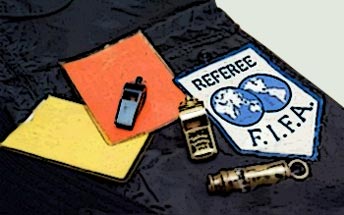
One minute before kick-off
The Fourth Official should make a note of the kick-off time, and the
relative position of the two Assistant Referees. He should also position
himself to allow the Referee to see where he is standing. Try and make
eye contact with the Referee - he may have left his coin or whistle in
the dressing room, and you should be ready to help him. Keep a coin and
a whistle and a watch on your person.
Thirty seconds before
kick-off
The Referee is responsible for supervising the clearing of the field -
the Fourth Official can also help in this duty.
The Referee should make eye contact with his Assistant Referees and the
Fourth Official to ensure that everything is in readiness before he
signals for the game to commence.
Kick-off
The Fourth Official should make a note of the kick-off time.
The Fourth Official should also start his stopwatch at the same time as
the Referee starts the game. During the pre-match briefing, the Referee
should have instructed the Fourth Official to either keep his watch
running all the time, or to stop and start in conjunction with the
Referee, thus keeping an accurate time for the duration of the half
being played. It is advisable for the Fourth Official to have two
stopwatches running. One that he allows to run continuously, and the
other that he stops and starts in conduction with the actions of the
Referee. This will ensure that, should the Fourth Official fail to
restart his watch after a stoppage, the continuously running watch will
at least save his blushes, should the Referee ask him for remaining
time!
The Fourth Official is responsible for ensuring that the occupants of
the bench are settled down as soon as possible. And to identify exactly
where the replacement balls are being stored. The Fourth Official should
then take a standing position between the benches, ensuring that both
sets of managers and the Referee know exactly where he is. Do not stand
directly in front of the benches, unless you want your head shouted off!
General Positioning
The Fourth Official's positioning throughout the match can be varied.
But he should aim to stay in the designated Fourth Officials position,
or in the same position unless he is performing a specific duty
elsewhere. If a seat is available in this area, this can be used, but
normally he should stand throughout the match - unless the Referee has
told him otherwise. Remaining in the same standing position will allow
the Referee to locate the Fourth Official quickly if required. If the
Referee has delegated the Fourth Official to take over from him, should
he sustain an injury, it is important for the Fourth Official to keep
warm and move about - but not to block the view of the technical area
occupants.
The Fourth Official would not be expected to enter the field of play
(apart from exceptional circumstances - for example, to prevent a
manager or substitute attacking another player on the field of play).
The Fourth Official's position should generally be near the technical
area - but he can (if circumstances warrant it) walk all the way around
the field of play. For example, he may need to warn substitutes warming
up in a prohibited area near one of the corner flags. If the Fourth
Official sees a violent conduct offence that has been missed by the
other officials, he may need walk along the touchline to gain the
Assistant Referee's attention - to enable that Assistant Referee to
signal the Referee.
During the game
The Fourth Official is responsible for the following:
Monitoring the further removal from the vicinity of the field of play
(according to the rules of the competition) of any player sent off by
the Referee. In this instance, the Fourth Official should not be
over-officious, as this could exasperate an already tense situation. The
Fourth Official's responsibility in this case, is to shepherd the player
away, and monitor (and deal with) potentially aggressive approaches by
other personal. Do not touch the player being sent-off.
Keep proper match records such as noting which team kicked of first, the
score and the time of kick-off etc.
Keeping detailed notes of any cautions and sending-offs. Noting the
time, number and if time allows the nature of the incident.
The Referee usually delegates the control of the technical area (bench)
to the Fourth Official. This will include management of any
substitutions throughout the game, and controlling and bringing to the
Referee’s attention any misconduct emanating from the bench. Bring to
the Referees attention, incidents emanating from the technical area
(bench) or from substitutes, such as, dissent, or offensive, insulting
or abusive language committed by words, or actions (including gestures).
Keep both of the technical areas under observation throughout the match.
If a problem arises with the technical area occupants, the Referee will
discuss the extent of the problem with the Fourth Official before taking
the appropriate action. The objective for dealing swiftly with this type
of behavior is to protect the spirit of the game, and to maintain the
authority of all of the officials. Do not expect the Referee to always
agree with you - if you are overruled, support the Referee's decision.
For instance, if the Fourth Official wants a member of the Bench to be
sent-off, but the Referee decides to only caution the culprit, then the
Fourth Official should 'bite his tongue' and not openly disagree with
the Referee. The Referee is solely responsible for administering
disciplinary action in the match. Avoid giving any suggestion of
resentment when the Referee acknowledges your advice but did not act
upon it as you would have liked.
Be constantly aware of the general movement and whereabouts of the Club
officials, substitutes and any another team personnel. Do not become
involved with match incident conversations that do not relate direct
with the duties of the Fourth Official. Do not attempt to justify any of
the Referee’s decisions. The Fourth Official must be alert to attempts
by team officials to engage him in argumentative discussion concerning
decisions made against their team. The Referee is the final
decision-maker on all matters concerning play. There will also be
occasions when the Fourth Official will need to calm down abuse from the
technical area occupants, directed towards the nearside Assistant
Referee. In such cases, the perpetrators must be warned in strong terms
to behave themselves. Situations where bad behaviors or abuse warrants
action by the Referee, must be brought to the Referees attention by the
Fourth Official immediately, and dealt with accordingly.
Look out for misconduct or other incidents that occur out of the view of
the Referee and the Assistant Referees.
Encourage celebrating players, who have approached the technical area,
to prepare for the kick-off without unduly wasting time.
Any technical area occupants, who leave the area to give instructions to
their players, should be asked to return.
Monitor the time, and let the Referee have confirmation (or time
remaining) by use of the usual discrete ‘time-down’ hand signals when
required.
Taking decisive smaller actions against the technical area occupants
early in the game will very often prevent more serious situations
arising later.
The Referee should ensure that the bench occupants and the substitutes
and managers know beforehand that the Fourth Official will be
responsible for looking after them - although the Fourth Official
himself, can make this known to the bench. This then allows the
Assistant Referee on the 'bench side' of the field of play, to
concentrate fully on the game and allows for greater responsibility and
control of the ‘Bench’ area by the Fourth Official.
Water containers should not be thrown onto the field of play, but passed
to players from the touchline (if the Referee allows this)
The Fourth Official is also responsible for indicating to the Referee
when the wrong player has been cautioned because of mistaken identity or
when a player has not been sent-off, having been seen to be given a
second caution or when violent conduct occurs out of the view of the
Referee and the Assistant Referees. The Referee, however, is ultimately
responsible for deciding on all points connected with play.
Treatment of Injured Players
Although the safety of the players must always be the main priority,
concerns have been expressed about the loss of playing time caused by
the assessment of injuries to players, and their removal from the field
of play. Referees must add the full amount of time lost at the end of
each period of play, for stoppages due to injury treatment and for any
other delays in play.
Keep alert and deal with players leaving and re-entering the field of
play either to adjust their equipment, or when they have bleeding
injuries or blood on their uniform. If (in his pre-match instruction)
the Referee has given the responsibility for checking players
re-entering to the Fourth Official, the Fourth Official can decide when
the equipment or bleeding has been properly dealt with. He can signal
the Referee himself, when a player is ready to re-enter the field of
play (or he can ask the nearest Assistant Referee to signal the Referee
on his behalf. The return of players into the field of play should be
done as soon as possible, and when the Referee has signaled a suitable
moment for re-entry. Players should not be allowed back on the field of
play until the Referee has beckoned them on by a clear signal.
If the Referee specifically wants to take the responsibility of checking
the players himself, then the Fourth Official should signal to the
Referee when the player is ready to be checked prior to re-entry.
Players, who have left the field of play to have their equipment
adjusted, are only allowed to re-enter during a stoppage in play. (See
Law 4)
Players who have left the field of play to be treated for an injury, can
re-enter on the Referee's signal during play, but the returning player
must enter along one of the touchlines - he is not allowed to enter
along the goal line (unless play is stopped).
When an injury occurs, the Fourth Official should prevent team officials
(or the technical area occupants) from rushing onto the field of play
without the Referee's permission. Use gentle persuasion to achieve this.
The trainer should only come onto the field of play after receiving a
signal from the Referee. Use discretion when small children are
concerned, and do not be over-officious if trainers or parents rush onto
the field of play to comfort a small child.
To prevent unnecessary aggravation prior to sorting out problems (such
as requesting substitutes to warm up in a different area), the Fourth
Official can engage the help of the team manager or coach, rather than
directly approach the substitutes himself.
If there is undue interference or improper conduct by the Fourth
Official, the Referee will relieve him of his duties and make a report
to the appropriate authorities.
Substitutions: (See Law 3 'The Number of Players' for Substitution
procedures).
Be
prepared to deal with substitution requests at any time during
the game.
The Fourth Official can be delegated the task of checking the
players equipment before entry onto the field of play.
Organizes and control all substitutions. Make a note of all
proceedings. Check the substitutes' equipment before they enter
the field of play on the halfway line. If their equipment does
not comply with the Laws of the Game, the Fourth Official must
inform the Referee, who will take the appropriate action.
The Senior Assistant Referee is normally responsible for
indicating to the Referee when a team wishes to make a
substitution. But where a Fourth Official is available, this
responsibility could be shared between the Fourth Official, and
the Assistant Referee. |
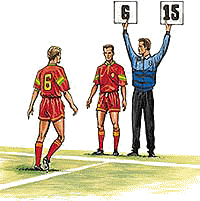 |
Check that the substitutes have been named on the official listings
before being allowed onto the field of play. If both teams are making
substitutions at the same time, keep the substitutes on their respective
technical area sides.
If display boards are available, use them to show the number of the
player leaving the field of play, and the number of the substitute
player entering the field of play.
Only allow the substitute to enter the field of play, after the exiting
player has left it.
Monitor substitutes when they are warming up - particularly if they are
near (and interfering with) one of the Assistant Referees.
Prevent and deal with anyone (particularly substitutes) who interferes
with the match officials.
Half-time
The Fourth Official should monitor the vacation of both of the technical
area (or benches) occupants, and ensure that no confrontation takes
place whilst players are making their way to the changing rooms. After
gathering any equipment (records, sign boards etc), and checking that
the match ball is in the possession of the Referee, he should join the
other match Officials before making his way to the officials' changing
room as a team to discuss any match points and compare records.
Before the commencement of the second half, the Fourth Official should
position himself between the technical areas (or benches) in good time
to monitor return of the occupants. He is also responsible for managing
and notifying to the Referee, any substitutions being made during the
half-time interval. Substitutes entering the field of play at the start
of the second half, should wait at the half-way line with the Fourth
Official, before being ushered onto the field of play after receiving
the Referee's signal. The Fourth Official should also note in his
records, the particulars of those players who have been substituted.
Extra-time
If extra time or the 'Golden Goal' is to be played, the Fourth Official
should remind the occupants of the Technical area of the requirements of
these periods of play. Prior to arriving at the game, the Fourth
Official must make himself conversant with the competition rules for
each game, and assist the Referee in ensuring that any transition
between full time to extra time (or Golden Goal) is made in an organized
way.
During kicks from the penalty mark, the Fourth Official can assist in
ensuring that substitutes and team officials do not enter the field of
play. He should also make a note of which players have taken kicks, and
keep a result of the score (just in case the Referee gets in a muddle).
Full-time
The Fourth Official should once again, monitor the vacation of both of
the technical area (or bench) occupants, and ensure that no
confrontation takes place whilst players are making their way to the
changing rooms. He should join the other match Officials before making
his way to the officials' changing room as a team to discuss any final
match points and compare records. In some cases, the Fourth Official
will ensure that the match balls have been recovered. The Referee will
compare match notes with the Fourth Official and his Assistant Referees,
to ensure that no match details have been missed.
After the match has ended
Ensure that all of the equipment under the responsibility of the Fourth
Official is gathered and returned to the correct place. Retrieve any
balls if necessary - including the match ball (if this is not already
under the control of the Referee). Join the Referee and the Assistant
Referees as soon as possible, and do not get involved with players or
team officials attempting to discuss match incidents.
Check and confirm match records with the Referee and the Assistant
Referees in the confines of the officials' changing room. If there are
any incidents that the other officials have missed, these must be
imparted to the Referee for inclusion in the match report.
The Fourth Official should participate fully in any after-match
discussions between the officials and any assessor. Review of post-match
incidents is essential to team fulfillment and understanding. The match
officials should stay together as a team until they leave the stadium or
the ground. This will lessen the chances of being singled out and abused
or harangued by irate players and team officials.
+-+ BACK TO TOP +-+
+-+ ADVICE from 'THE PITCH' +-+
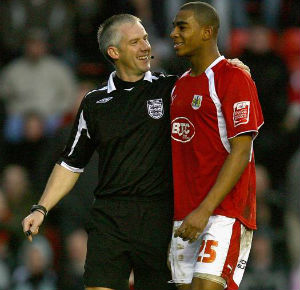 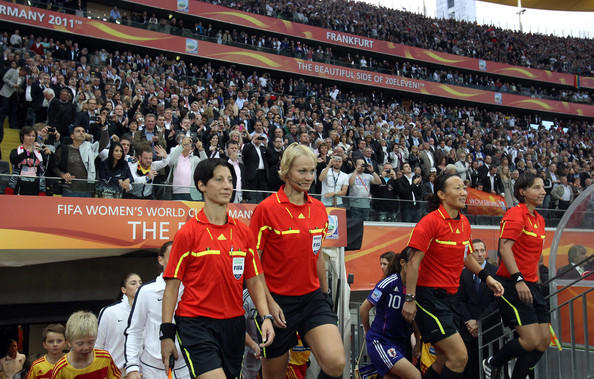 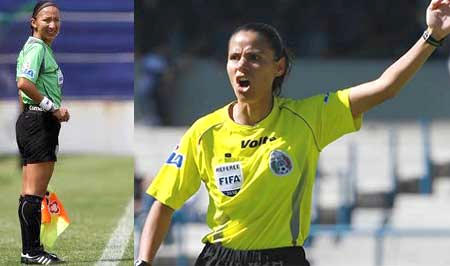 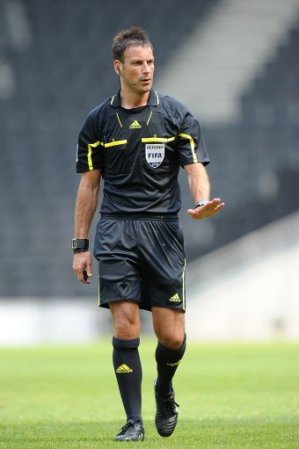
List of Fourth Official's
Responsibilities.
 - Arrive at the ground, and in the officials’ changing room early, and
at the appropriate expected time. Dress smartly and in a confident
manner.
- Arrive at the ground, and in the officials’ changing room early, and
at the appropriate expected time. Dress smartly and in a confident
manner.
 - Assist the Referee to approach the game calmly and confidently. Adopt
a friendly and fully co-operative attitude towards your Refereeing
colleagues.
- Assist the Referee to approach the game calmly and confidently. Adopt
a friendly and fully co-operative attitude towards your Refereeing
colleagues.
 - Give the Referee every possible support, before, during and after the
match. Keep eye contact with the Referee at all times during the game -
this indicates that all matters under the Fourth Official's
responsibility are under control.
- Give the Referee every possible support, before, during and after the
match. Keep eye contact with the Referee at all times during the game -
this indicates that all matters under the Fourth Official's
responsibility are under control.
 - Be conversant with the competition rules before each game.
- Be conversant with the competition rules before each game.
Take proper notice of the Referee's pre-match briefing, and politely
clarify any uncertainty arising.
 - Have all the expected Referee accoutrements in you pockets; such as
spare whistle, notebook, tissues, coin etc......
- Have all the expected Referee accoutrements in you pockets; such as
spare whistle, notebook, tissues, coin etc......
 - Carry out the duties delegated by the Referee, properly, smartly,
efficiently and pleasantly.
- Carry out the duties delegated by the Referee, properly, smartly,
efficiently and pleasantly.
 - Participate fully in the Referee's pre-match and post match brief.
- Participate fully in the Referee's pre-match and post match brief.
 - Take responsibility for anything delegated by the Referee.
- Take responsibility for anything delegated by the Referee.
 - Sort out the Referee's changing room supplies by interacting with the
facility manager.
- Sort out the Referee's changing room supplies by interacting with the
facility manager.
 - Accompany the Senior Assistant Referee whilst he inspects the players'
equipment before the game has started. (Checking players’ equipment will
depend on competition rules).
- Accompany the Senior Assistant Referee whilst he inspects the players'
equipment before the game has started. (Checking players’ equipment will
depend on competition rules).
Identify the Team Managers and Coaches, and discuss with them,
substitution procedure, warm-up areas and injury procedures. And clear
up any ambiguities concerning the Competition Rules.
 - Assist with any administrative duties before, during and after the
match, as delegated by the Referee.
- Assist with any administrative duties before, during and after the
match, as delegated by the Referee.
 - Obtain, and supervise the replacement footballs, where required. If
the match ball has to be replaced during a match, provide another ball,
on the instruction of the Referee, thus keeping the delay to a minimum.
Speak to any 'ball-handlers' particularly about entering the field of
play and retrieving extra balls on the field of play
- Obtain, and supervise the replacement footballs, where required. If
the match ball has to be replaced during a match, provide another ball,
on the instruction of the Referee, thus keeping the delay to a minimum.
Speak to any 'ball-handlers' particularly about entering the field of
play and retrieving extra balls on the field of play
 - Remind the
ball-handlers of their neutrality.
- Remind the
ball-handlers of their neutrality.
 -
Be fully prepared at all times, to take over either as the Referee, or
one of the Assistant Referees.
-
Be fully prepared at all times, to take over either as the Referee, or
one of the Assistant Referees.
 - Conscientiously prepare yourself for
either the Assistant Referee's role, or the Referee's role, should any
of them become injured.
- Conscientiously prepare yourself for
either the Assistant Referee's role, or the Referee's role, should any
of them become injured.
 -
Inspect the substitutes' equipment prior to entry onto the field of
play. (This will depend on the requirement of the competition rules).
-
Inspect the substitutes' equipment prior to entry onto the field of
play. (This will depend on the requirement of the competition rules).
 -
Be the focal point for persons other than players, substitutes and team
officials (e.g. stadium staff, security staff, ball-persons).
-
Be the focal point for persons other than players, substitutes and team
officials (e.g. stadium staff, security staff, ball-persons).
 -
Collect any Team Sheets prior to the game, and pass them on to the
Referee.
-
Collect any Team Sheets prior to the game, and pass them on to the
Referee.
 -
Make a note of the captains' numbers before the game commences.
-
Make a note of the captains' numbers before the game commences.
 -
Organizes relevant paperwork during substitutions and verifying that the
information is correct. And check that the substitutes have been named
on the official listings before being allowed onto the field of play.
Record the time of any substitutions.
-
Organizes relevant paperwork during substitutions and verifying that the
information is correct. And check that the substitutes have been named
on the official listings before being allowed onto the field of play.
Record the time of any substitutions.
 -
Inform the nearest Assistant Referee of any substitution request. And
seek his help if needs be, to signal the Referee.
-
Inform the nearest Assistant Referee of any substitution request. And
seek his help if needs be, to signal the Referee.
 -
Stand at the halfway line, by the halfway line flag with the substitute
until the Referee signals for the substitution to take place. Use your
common sense on local grounds where substitutes can sometimes forget
that they must enter on the halfway line; or where there is no properly
designated technical area.
-
Stand at the halfway line, by the halfway line flag with the substitute
until the Referee signals for the substitution to take place. Use your
common sense on local grounds where substitutes can sometimes forget
that they must enter on the halfway line; or where there is no properly
designated technical area.
 -
Be prepared to deal with substitution requests at any time during the
game.
-
Be prepared to deal with substitution requests at any time during the
game.
 -
If display boards are available, use them to show the number of the
player leaving the field of play, and the number of the substitute
player entering.
-
If display boards are available, use them to show the number of the
player leaving the field of play, and the number of the substitute
player entering.
 -
Allow the substitute to enter the field of play - but only when the
outgoing player has left the field of play.
-
Allow the substitute to enter the field of play - but only when the
outgoing player has left the field of play.
 -
Having completed the specific substitution monitoring duties, quickly
take up your normal position between the technical areas (or benches).
-
Having completed the specific substitution monitoring duties, quickly
take up your normal position between the technical areas (or benches).
 -
Monitor substitutes when they are warming up - particularly when they
are near (and influencing) one of the Assistant Referees
-
Monitor substitutes when they are warming up - particularly when they
are near (and influencing) one of the Assistant Referees
 -
Check the equipment of substitutes before they enter the field of play.
If their equipment does not comply with the Laws of the Game, inform the
Referee.
-
Check the equipment of substitutes before they enter the field of play.
If their equipment does not comply with the Laws of the Game, inform the
Referee.
 -
When the end of time approaches, pass clear 'time remaining' signals to
the Referee, preferably during natural stoppages of play. Indicate the
last 5 minutes with appropriate number of fingers pointing downward
against the background of the shorts. Time expired, signal = closed fist
on the shorts, or fist to the chest (arm across the chest).
-
When the end of time approaches, pass clear 'time remaining' signals to
the Referee, preferably during natural stoppages of play. Indicate the
last 5 minutes with appropriate number of fingers pointing downward
against the background of the shorts. Time expired, signal = closed fist
on the shorts, or fist to the chest (arm across the chest).
 -
Note the added time to be played at the end of each half - as indicated
by the Referee. Advertise this additional time by the display of number
boards etc.. (This only applies to top-level games).
-
Note the added time to be played at the end of each half - as indicated
by the Referee. Advertise this additional time by the display of number
boards etc.. (This only applies to top-level games).
 -
Supervise the departure of the teams’ or/and bench personnel at the end
of each half.
-
Supervise the departure of the teams’ or/and bench personnel at the end
of each half.
 -
Can meet the Referee on the field of play at the end of each half, by
quickly joining the Referee when he/she blows the whistle for half-and
full-time.
-
Can meet the Referee on the field of play at the end of each half, by
quickly joining the Referee when he/she blows the whistle for half-and
full-time.
 -
Leave the field of play with the other officials, as a team, and after
the two opposing teams have departed or have otherwise ceased all
competitive activities.
-
Leave the field of play with the other officials, as a team, and after
the two opposing teams have departed or have otherwise ceased all
competitive activities.
 -
Proceed to the officials' changing room at half time and at full time to
discuss match details in a calm post-match discussion in privacy.
Clarify any misunderstandings, confusion or breakdown of teamwork that
occurred during the game, and agree what should be done about any
misunderstandings.
-
Proceed to the officials' changing room at half time and at full time to
discuss match details in a calm post-match discussion in privacy.
Clarify any misunderstandings, confusion or breakdown of teamwork that
occurred during the game, and agree what should be done about any
misunderstandings.
 -
At half time and at full-time, check that the match ball is in the
possession of the Referee - if not, then retrieve it.
-
At half time and at full-time, check that the match ball is in the
possession of the Referee - if not, then retrieve it.
 -
Avoid giving any suggestion of resentment when the Referee acknowledges
your advice but did not act upon it as you would have liked.
-
Avoid giving any suggestion of resentment when the Referee acknowledges
your advice but did not act upon it as you would have liked.
 -
Work together as a team, and always back up the Referee's decisions.
-
Work together as a team, and always back up the Referee's decisions.
 -
Prior to sorting out problems (such as requesting substitutes to warm up
in a different area), to prevent unnecessary aggravation, the Fourth
Official should engage the help of the team manager or coach, rather
than directly approach the substitutes themselves.
-
Prior to sorting out problems (such as requesting substitutes to warm up
in a different area), to prevent unnecessary aggravation, the Fourth
Official should engage the help of the team manager or coach, rather
than directly approach the substitutes themselves.
 -
Don't comment or talk to the crowd or to the managers in such a way that
will antagonize them.
-
Don't comment or talk to the crowd or to the managers in such a way that
will antagonize them.
 -
Retain a sense of humor.
-
Retain a sense of humor.
 -
Be polite at all times to all people.
-
Be polite at all times to all people.
 -
Keep out of the way of the spectator's viewpoint and take the proper
action if they encroach. The home team is responsible for the behavior
of the spectators – seek help from the ground staff or security staff to
deal with this.
-
Keep out of the way of the spectator's viewpoint and take the proper
action if they encroach. The home team is responsible for the behavior
of the spectators – seek help from the ground staff or security staff to
deal with this.
 -
Keep alert always.
-
Keep alert always.
 -
Recognize and immediately respond to any gesture from the Referee that
conveys his need for your assistance or advice. For example, the Referee
may signal the Fourth Official to organize the turning on of the
floodlights, due to inclement darkening weather.
-
Recognize and immediately respond to any gesture from the Referee that
conveys his need for your assistance or advice. For example, the Referee
may signal the Fourth Official to organize the turning on of the
floodlights, due to inclement darkening weather.
 -
Record the name (if team sheets are available), and club identity of any
player who has been disciplined by the Referee during the match. After
the match, submit a report to the appropriate authorities on any
misconduct or other incident that has occurred out of the view of the
Referee and the Assistant Referees. Advise the Referee and his
Assistants of any report being made.
-
Record the name (if team sheets are available), and club identity of any
player who has been disciplined by the Referee during the match. After
the match, submit a report to the appropriate authorities on any
misconduct or other incident that has occurred out of the view of the
Referee and the Assistant Referees. Advise the Referee and his
Assistants of any report being made.
 -
Keep alert and deal with players leaving and re-entering the field of
play either to adjust their equipment, or when they have bleeding
injuries or blood on their uniform. If given this responsibility, check
the return onto the field of play, those players who have been treated
for bleeding wounds or blood on the uniform, or after a player's
equipment has been adjusted.
-
Keep alert and deal with players leaving and re-entering the field of
play either to adjust their equipment, or when they have bleeding
injuries or blood on their uniform. If given this responsibility, check
the return onto the field of play, those players who have been treated
for bleeding wounds or blood on the uniform, or after a player's
equipment has been adjusted.
 -
When an injury occurs, prevent team officials (or the technical area
occupants) from rushing onto the field of play before receiving the
Referee's permission. Players should be prevented from re-entering the
field of play until the Referee has beckoned them on by a clear signal.
Use gentle persuasion to achieve this. Use discretion when small
children are concerned, and do not be over-officious if trainers or
parents rush onto the field of play to comfort a small child.
-
When an injury occurs, prevent team officials (or the technical area
occupants) from rushing onto the field of play before receiving the
Referee's permission. Players should be prevented from re-entering the
field of play until the Referee has beckoned them on by a clear signal.
Use gentle persuasion to achieve this. Use discretion when small
children are concerned, and do not be over-officious if trainers or
parents rush onto the field of play to comfort a small child.
 -
Manage the Technical Areas, and keep both of them under close
observation throughout the match.
-
Manage the Technical Areas, and keep both of them under close
observation throughout the match.
Inform the Referee of any unruly or irresponsible behavior committed by
the technical area occupants.
Inform the Referee if a player or substitute (a) has been cautioned or
sent off based on an incorrect identification: (b) has not been sent off
despite having received a second caution: or (c) has committed violent
conduct out of the view of the Referee and Assistant Referees.
 -
Always keep players, substitutes and team officials under observation.
Be aware of the general movement and whereabouts of the Club officials
and any another team personnel throughout the game.
-
Always keep players, substitutes and team officials under observation.
Be aware of the general movement and whereabouts of the Club officials
and any another team personnel throughout the game.
 -
Only authorized personnel are allowed inside the technical area. Remove
any unauthorized personnel.
-
Only authorized personnel are allowed inside the technical area. Remove
any unauthorized personnel.
 -
Any technical area occupants, who leave the area to give instructions to
their players, should be asked to return. Always speak in a professional
and calming manner.
-
Any technical area occupants, who leave the area to give instructions to
their players, should be asked to return. Always speak in a professional
and calming manner.
 -
Taking decisive smaller actions against the technical area occupants
early in the game will very often prevent more serious situations
arising later.
-
Taking decisive smaller actions against the technical area occupants
early in the game will very often prevent more serious situations
arising later.
 -
Prevent and deal with anyone else who interferes with the match
officials.
-
Prevent and deal with anyone else who interferes with the match
officials.
 -
Prevent water containers from being thrown onto the field of play. These
can be passed to players from the touchline (if the Referee allows
this).
-
Prevent water containers from being thrown onto the field of play. These
can be passed to players from the touchline (if the Referee allows
this).
 -
Remain in the same standing position during the game (unless performing
another duty). This allows the Referee to locate the Fourth Official
quickly if required.
-
Remain in the same standing position during the game (unless performing
another duty). This allows the Referee to locate the Fourth Official
quickly if required.
 -
Keep an eye on the behavior of the ‘ball-persons’ (for example, ensure
that they do not show favoritism to one team. Or enter the field of play
etc.)
-
Keep an eye on the behavior of the ‘ball-persons’ (for example, ensure
that they do not show favoritism to one team. Or enter the field of play
etc.)
 -
Do not become involved during the game, with match incident
conversations that do not relate direct with the duties of the Fourth
Official. Maintain a professional composure throughout.
-
Do not become involved during the game, with match incident
conversations that do not relate direct with the duties of the Fourth
Official. Maintain a professional composure throughout.
 -
The Fourth Official should participate fully in any after-match
discussions between the officials and any assessor.
-
The Fourth Official should participate fully in any after-match
discussions between the officials and any assessor.
The responsibilities shown above, increases the authority of the Fourth
Official and allows him to take action in situations concerned with
actual play, and with situations not concerned with actual play.
The listing above serves to remind you of the complexities of being a
Fourth Official. I suppose that it will not be too long before we see a
Fifth official!
And you thought that the
Fourth Official's task was easy - Not any more!!!!!!!!!!!
|
